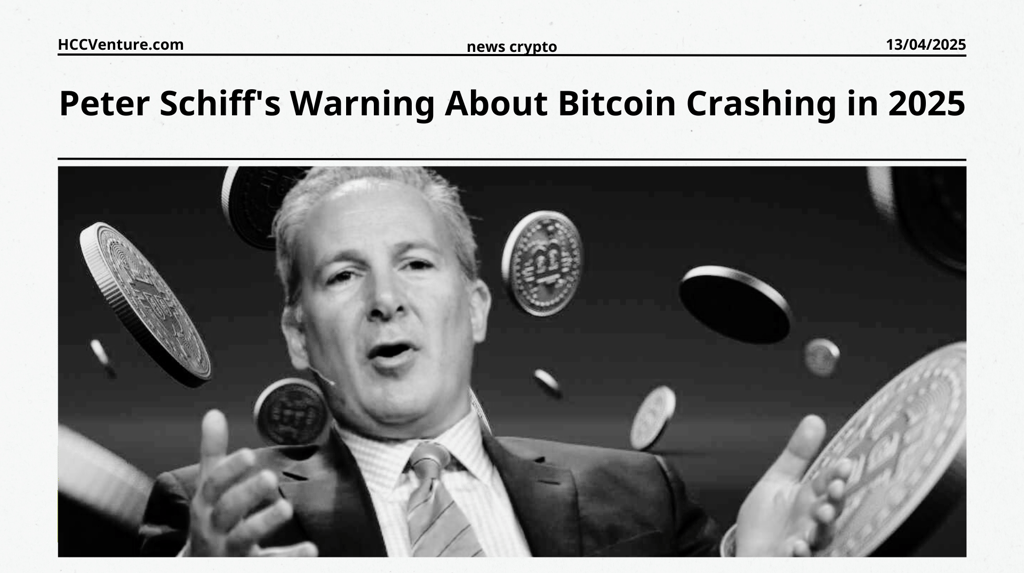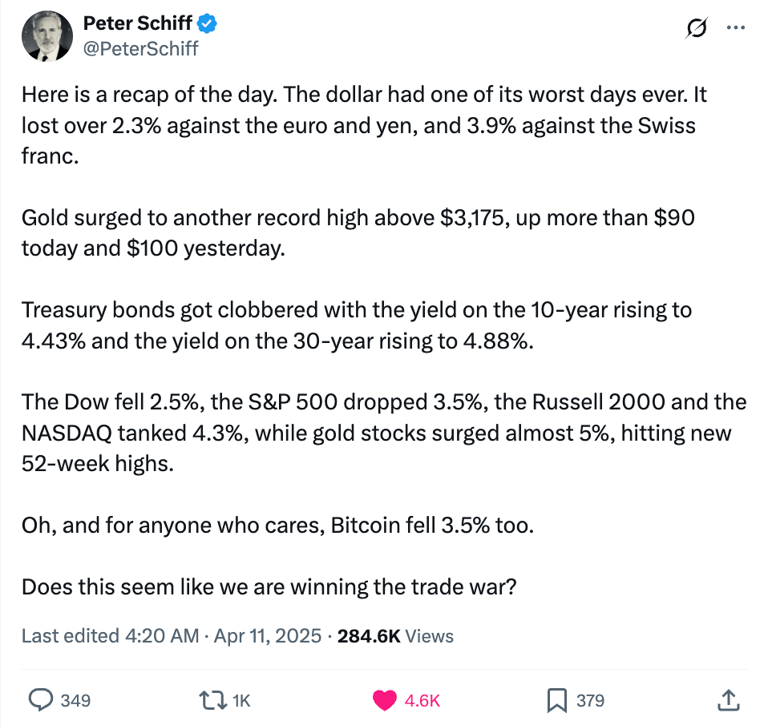Peter Schiff's Warning of Bitcoin Crash in 2025 – Signal or Controversy?
Renowned economist and gold advocate Peter Schiff made a shocking statement on social media, predicting that the 2025 financial crisis will “kill” Bitcoin – the cryptocurrency born from the 2008 financial crisis.
4/13/20254 min read


Background of the warning
Peter Schiff, a conservative economist and longtime Bitcoin skeptic, has long argued that cryptocurrencies lack intrinsic value and are not comparable to traditional assets like gold. Given the volatility in global financial markets in early 2025, Schiff’s statement was not entirely unexpected but still drew a lot of attention.
The cryptocurrency market has seen a significant decline recently. According to reports, the price of Bitcoin has fallen by about 27% from its peak of over $100,000 in January 2025 to around $75,000 on April 10. This decline coincided with the “Black Monday” event on April 7, when stocks, cryptocurrencies, and many other assets plunged. In addition, global trade tensions, including the US imposing a 145% tariff on Chinese goods and China retaliating with a 125% tariff, have increased fears of an economic recession.
Another factor that underpins Schiff’s claim is the creation of the U.S. Strategic Bitcoin Reserve on March 6, 2025, under the direction of the Trump administration. However, Schiff claims that the reserve has lost more than 12% of its value since its creation, while gold – an asset he has always supported – has increased in value by about 2% over the same period.
Peter Schiff's argument
Schiff argues that Bitcoin, which was created as an alternative to the traditional financial system after the 2008 crisis, will not survive another financial crisis. He calls this a “paradox” – something that was born out of a crisis will be destroyed by another crisis. Key points of Schiff’s argument include:
Bitcoin Volatility: Schiff stressed that Bitcoin is not the “safe haven asset” that many proponents claim. During recent market sell-offs, Bitcoin has fallen more than other assets, raising doubts about its store of value.
Comparison to gold: Schiff argues that gold, with its long history and stability, is a superior choice to Bitcoin. He points out that while Bitcoin has lost value, gold has steadily increased in price, reinforcing the view that gold is a reliable asset in times of uncertainty.
Bitcoin Reserve Criticism: Schiff calls the US Bitcoin Reserve a “scam” by the cryptocurrency industry, designed to lure inexperienced investors. He argues that if the US invested in gold instead of Bitcoin, the reserve would have made a profit instead of losing money.
Crash Prediction: Schiff predicts that if the stock market, especially the Nasdaq, enters a bear market phase, Bitcoin could fall to $20,000 or lower, wiping out much of its value.


Community response
Schiff’s warning has received mixed reactions from the cryptocurrency community and investors. Schiff’s supporters agree that Bitcoin and other cryptocurrencies are too risky amid economic uncertainty. They point to the recent decline in Bitcoin and Bitcoin ETFs (which lost $871.6 million in six days) as evidence of the fragility of the market.
Bitcoin proponents, on the other hand, argue that Schiff is overstating the danger and ignoring Bitcoin’s resilience. They point out that Bitcoin has repeatedly beaten doomsday predictions in the past, including crashes in 2018 and 2022. Some argue that the current volatility is just part of the market cycle and that Bitcoin still has the potential to recover as investor sentiment improves. Additionally, institutional investors like MicroStrategy continue to accumulate Bitcoin, indicating long-term confidence in the asset.
The crypto community has also criticized Schiff for his gold bias and ignoring the benefits of blockchain technology, such as decentralization and censorship resistance. Some users on X even called Schiff’s statement a “publicity stunt” to promote his personal views.
Implications for the Cryptocurrency Market
Schiff’s warning raises several important questions about the future of Bitcoin and cryptocurrencies amid a challenging global economic environment. Here are some of the potential implications:
Market sentiment: Negative predictions from an influential figure like Schiff could increase fear, leading to short-term selling pressure. However, history shows that the cryptocurrency market often recovers after sharp price drops.
Gold vs Bitcoin Competition: The debate between gold and Bitcoin as a safe haven asset will continue to be the focus of attention. While gold has the advantage of stability, Bitcoin attracts younger investors with the promise of high returns and innovation.
Cryptocurrency Policy: The US Strategic Bitcoin Reserve is an important step in legitimizing cryptocurrencies, but its failure (if it happens) could undermine confidence in similar initiatives in the future.
Bitcoin's resilience: If Bitcoin can survive a potential 2025 crash, it will cement its status as a resilient asset. Conversely, a major crash would be an opportunity for critics like Schiff to strengthen their case.
Conclude
Peter Schiff’s warning of a Bitcoin crash by 2025 is a reminder of the volatile nature of the cryptocurrency market and the challenges it faces in times of economic uncertainty. While Schiff’s argument is well-founded based on recent market data and a conservative view of the asset, it also ignores the long-term potential of Bitcoin and blockchain technology. The debate between skeptics like Schiff and cryptocurrency advocates will continue to shape public perception of the asset class.
In the current climate, investors need to be cautious, weighing both risks and opportunities. Is Bitcoin really facing the “apocalypse” that Schiff predicts, or will it once again prove its resilience? Only time will tell.
Explore HCCVenture group
HCCVenture © 2023. All rights reserved.

Connect with us
Popular content
Contact to us
E-mail : sp_contact@hccventure.com
Register : https://linktr.ee/holdcoincventure
Disclaimer: The information on this website is for informational purposes only and should not be considered investment advice. We are not responsible for any risks or losses arising from investment decisions based on the content here.


TERMS AND CONDITIONS • CUSTOMER PROTECTION POLICY
ANALYTICAL AND NEWS CONTENT IS COMPILED AND PROVIDED BY EXPERTS IN THE FIELD OF DIGITAL FINANCE AND BLOCKCHAIN BELONGING TO HCCVENTURE ORGANIZATION, INCLUDING OWNERSHIP OF THE CONTENT.
RESPONSIBLE FOR MANAGING ALL CONTENT AND ANALYSIS: HCCVENTURE FOUNDER - TRUONG MINH HUY
Read warnings about scams and phishing emails — REPORT A PROBLEM WITH OUR SITE.
